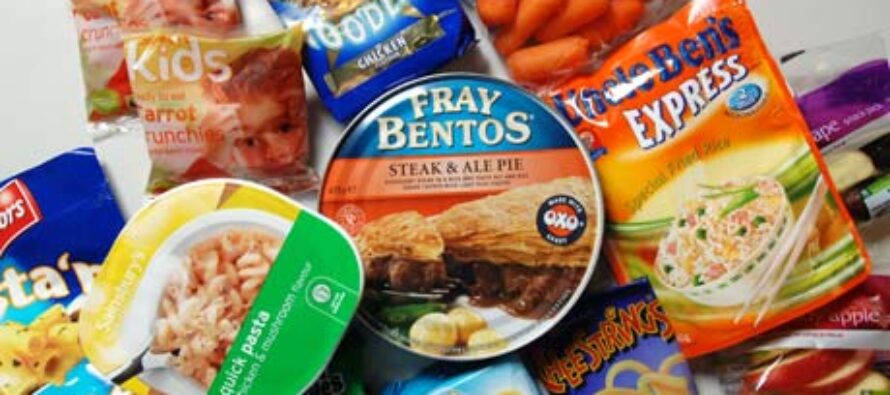Convenience food changes could save ‘thousands of lives’

![]()
Convenience food changes could save ‘thousands of lives’
Sarah Boseley, health editor
Tens of thousands of lives could be saved if major changes were made to processed and convenience foods, the UK’s leading health watchdog will say today, challenging the government and the food industry to act to improve the nation’s diet. The National Institute for Health and Clinical Excellence (Nice) will say in a major hard-hitting report that diet is not just a matter for the individual consumer. In what will be interpreted as a significant attack on the food industry, it recommends a series of changes, including:
• A total ban on trans fats.
• Halving the individual daily salt intake.
• Legislating if necessary to encourage manufacturers to slash the content of hidden saturated fats in all food products.
• Ensuring low fat and low salt foods are cheaper than unhealthier versions.
• Banning television adverts for high-salt and high-fat foods before the 9pm watershed, to protect children.
• Urging local councils to forbid take-aways and junk food outlets near schools.
• Bringing in the “traffic light” colour coding system to show whether a product has high, low or medium levels of salt, fat and sugar.
But the government reaction was unenthusiastic, implying that it was up to the individual to make healthy choices. “The best way to prevent cardiovascular disease is for people to eat better and be more active,” a government spokesperson said. “The NHS provides high quality cardiac care and there has been a reduction in cardiovascular deaths of about 50% over the last 15 years through better prevention and better treatment.”
The statement went on to suggest that Nice might have over-reached itself. “Today’s recommendations are extensive and wide ranging, but it is not practical to implement certain proposals in this guidance, for example on the mandatory use of traffic lights alongside GDA [guideline daily allowance] in food labelling. It is extremely important that work by Nice is methodologically robust and includes fully workable proposals”.Cardiovascular disease is responsible for at least 150,000 deaths a year, mostly through heart attacks and strokes. About 40% of those who die are under 75. “These are eminently preventable deaths,” said Klim McPherson, professor of health epidemiology at Oxford University and chairman of the Nice committee which deliberated for more than two years. Poorer people have up to a threefold increased risk of heart disease over those who live in more affluent areas of the country. The focus for the Nice committee was safeguarding the population, rather than advising the individual who may have limited options. “It is about busy people having a lot to do, having to make choices on the fly, making pragmatic choices on how they feed themselves and their children,” said McPherson. “Commercial organisations are very good at exploiting people who make choices on price and convenience.” The government would not be breaking new ground if it were to legislate on healthy food, he added. “We think it is commensurate with other bits of policy government gets involved with, like speed limits and clean air,” he said. Simon Capewell, professor of clinical epidemiology at Liverpool University and a public health physician, said the changes would make economic sense too. “We’re looking at well over £1bn a year in savings, not just to the NHS.” That included, for instance, fewer people being forced to give up work to care for somebody who was disabled through heart disease. The committee was very concerned about the salt, fat and sugar levels in children’s diet, which could predispose them to unhealthy eating patterns and to heart disease from a relatively early age. The Nice guidance calls for action on the way food is marketed to children – with a 9pm watershed on advertising unhealthy food. It urges advertising curbs also on non-broadcast media, the internet and mobile phones. It wants an agreed set of principles for food and drinks marketing, “based on a child’s right to a healthy diet”. The committee regretted that the EU has decided against traffic light colour-coding to indicate the nutritional content of food products, which it said was the clearest indication to shoppers whether they were buying something good or bad for them. It urged the government to introduce it anyway through legislation – a suggestion that was immediately rejected by the Department of Health. Nice also called for transparency in the dealings between government and the food and drinks industry, including “full disclosure of interests by all parties”. The Food and Drink Federation said Nice was out of touch with what was happening, claiming voluntary measures by the industry had already substantially brought down salt, sugar, saturated fat and trans fat levels. The Nice report was supported, however, by the European Society of Cardiology and the British Heart Foundation.
Related Articles
La OTAN apoya y combate simultáneamente a Al Qaida desde Malí hasta Siria
![]()
Rediseño de África: EEUU apoya a Al Qaida en Malí. Francia viene al rescate Tony Cartalucci Mondialisation Traducido para Rebelión por
Gerry Adams on Traveller Ethnicity
![]()
We publish here the statement to Dail by Sinn Fein President Gerry Adams I want to welcome the Traveller groups
Turkey: The New indispensable nation
![]()
RECEP TAYYIP ERDO?ANPrime Minister of Turkey Turkey put its imprint as one of the most influential countries not only on




